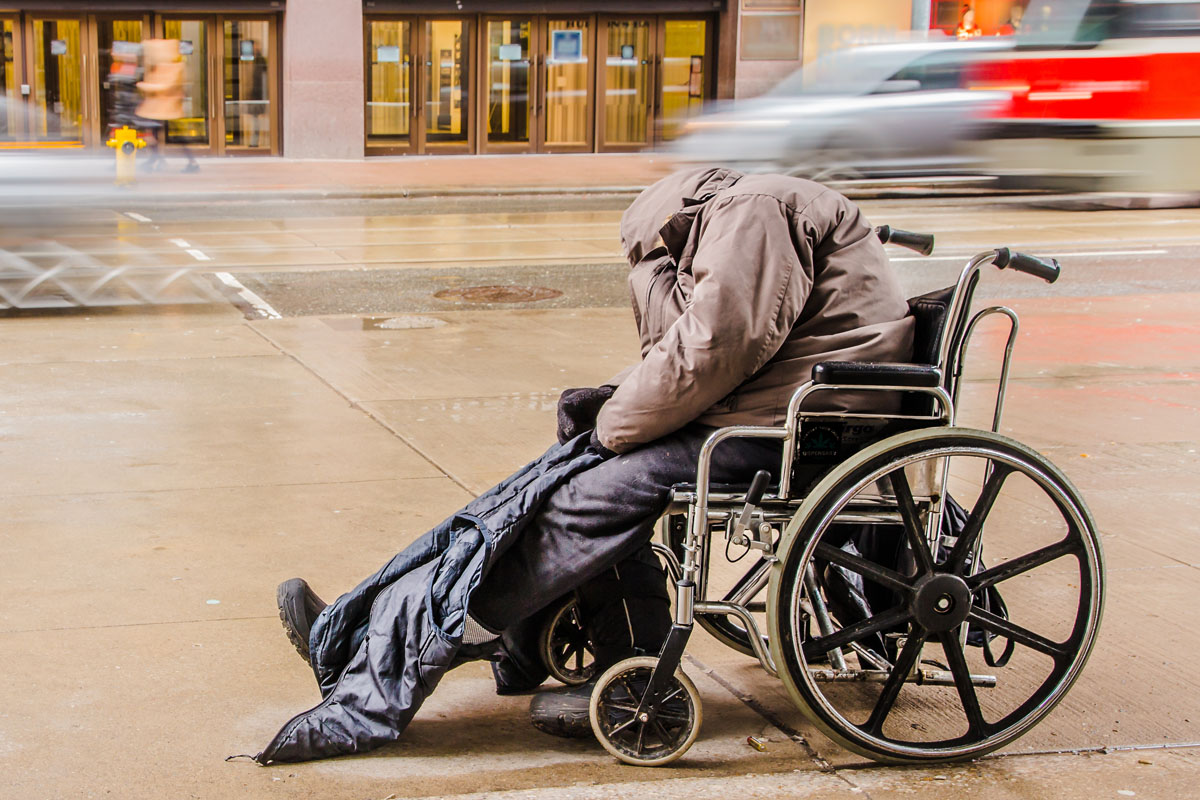I want to build on my last column: becoming sick while homeless. We all know how horrible it is to suffer with a bad cold, flu or virus. As I said, it’s far worse when you aren’t in your own home or any sort of safe place. But what if you are chronically ill? What if you are disabled? What if every day of your life, you live in pain? Trust me, this goes beyond just being hit with a bad cold or flu. At least with an acute illness, you have some hope of getting over them within a week or two. It’s quite another thing if you are suffering from something chronic.
In my case, I have a rather long list of autoimmune and neurological conditions. Due to my high functioning autism, I also have many sensitivities. Between all of it, there are days I just cannot cope.
And yet I know people who are worse off than I am.
One such person is my friend on Twitter, known as “@[email protected]”. She has asked me not to use her actual name so let’s just call her Dallas. She gave me permission to share her story, which is heartbreaking and yet not unique. I’ve heard similar stories all too many times. She had suffered injuries in her 20s. By the time she reached her 40s, she had serious, chronic back pain. Then she was diagnosed with two different types of breast cancer. She had a double mastectomy and has been receiving chemo ever since.
While fighting cancer, her husband left and she found herself homeless. At first, she stayed with friends. Soon, those invitations became less frequent, and she ended up on the street. With no vehicle, she must find rides to her chemo sessions. Sometimes she can stay in a shelter, but that’s not always an option. She is hoping to find an affordable living situation. But as of late February, she does not have housing.
I once had a coworker with cancer.
She was a trooper. While she often felt ill from the chemo, she came to work anyway. She would sometimes vomit and need to rest. But whoever she was working with that day would pick up some of the slack. The question is: do you think she’d have been able to keep that part-time job while being sick with cancer if she had been living on the street? People truly do not realize it until it happens to them, but getting cancer is devastating for most people. So is being homeless. Now imagine both happening to you at the same time! It’s inconceivable and yet that is how life is for Dallas.
Living with any chronic condition and/or disability is not easy. You find yourself up against many limitations. Unable to hold a decent paying job, life is not good for people existing solely on social security and food stamps. Those who did not pay into social security long enough before becoming disabled will receive a very low amount of monthly benefits – nowhere near enough income to live on. I know many disabled people who receive less than $800 a month to live on, even in New York. In upstate NY, you would be lucky to find a room for rent for under $600 a month. That would leave $200 for car insurance, gas, clothes and food after your small SNAP allotment runs out, vehicle repairs, etc. and so on. Everyone knows that $200 does not go far in 2020; even less so for those living in expensive areas.
But what about getting fast-tracked into housing?
Surely a disabled person would be fast-tracked, right? Wrong. I’m sure it happens occasionally, but none of the women I keep in touch with have been fast-tracked into housing. Some of them have been homeless for more than four years! As they live in cars and tents all over America, they are on waiting lists upwards of seven years long. There are so many people and far too few housing options. You may be on a fast-track list, but the waiting list is still long.
Certainly the lack of affordable housing is a massive problem. But there are more limitations for people with disabilities.
While lack of affordable housing is an issue, special needs affordable housing is even scarcer. Disability-friendly housing is not commonplace in many areas.
Some apartments are built with a few specifications that qualify it as handicapped accessible. However, these are not abundant and what does exist will not accommodate all handicaps and special needs.
The very people suffering the most have the least prospects for a better life. We are trapped in an infinite loop. We cannot afford a home that meets our special needs and requirements so we remain homeless. Our conditions worsen from lack of quality sleep, chronic high stress levels and having other basic human needs go unmet. There is no way to get back on your feet, even if you have a condition that could possibly improve.
Life for disabled and special needs homeless people goes beyond wheel chair ramps and a grip bar in the shower. Some of us need modified and customized homes. Until then, we remain trapped in the infinite loop of despair and hopelessness. We will continue to suffer with conditions worsening year after year until eventually the story ends.











